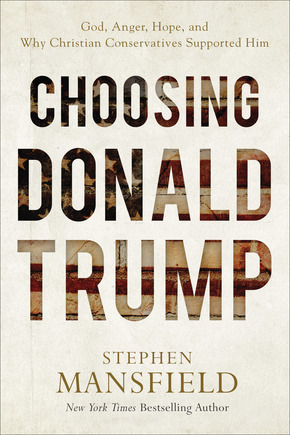Since November 8, 2016, one question has dominated media ad nauseam: how did this happen? How did Donald J. Trump—a man full of narcissistic bravado, who publicly mocked a disabled reporter, failed to unequivocally denounce white nationalism and the KKK, insulted political opponents and women with unparalleled crassness, bragged about sexual assault, passing it off as locker room talk, and also bragged about his sexual exploits in public forms—become president? Why did 81% of evangelicals support him, a higher percentage of support than either George W. Bush or Mitt Romney received? In one night, white evangelicals swung from the demographic most likely to say that personal character matters in assessing a leader’s public ethics, to the group that said it mattered the least.
 A lot of ink has been spilled, attempting to answer the question of why Donald Trump. Stephen Mansfield tackles this question directly in Choosing Donald Trump: God, Anger, Hope and Why Christian Conservatives Supported Him. Mansfield is a historian, conservative Christian and cultural critic. He boasts strong evangelical credentials and of all the people who have endeavored to tackle the Trump phenomenon, he may be the whitest (I can’t actually back that up). His previous books include a Christian book about manly men doing manly things, The Mansfield Book of Manly Men (Thomas Nelson, 2013), as well as books about the faiths of presidents and world leaders: The Faith of George W. Bush (Tarcher, 2003), The Faith of Barak Obama (Thomas Nelson, 2008), Lincoln’s Battle with God (Thomas Nelson, 2012), and The Character and Greatness of Winston Churchill (Cumberland House, 2004).
A lot of ink has been spilled, attempting to answer the question of why Donald Trump. Stephen Mansfield tackles this question directly in Choosing Donald Trump: God, Anger, Hope and Why Christian Conservatives Supported Him. Mansfield is a historian, conservative Christian and cultural critic. He boasts strong evangelical credentials and of all the people who have endeavored to tackle the Trump phenomenon, he may be the whitest (I can’t actually back that up). His previous books include a Christian book about manly men doing manly things, The Mansfield Book of Manly Men (Thomas Nelson, 2013), as well as books about the faiths of presidents and world leaders: The Faith of George W. Bush (Tarcher, 2003), The Faith of Barak Obama (Thomas Nelson, 2008), Lincoln’s Battle with God (Thomas Nelson, 2012), and The Character and Greatness of Winston Churchill (Cumberland House, 2004).
Notably, Mansfield does not attempt to write a book on the faith of Donald Trump, as he did with Bush and Obama. He attempts instead to answer how Donald Trump became evangelicals’ champion, though he does address the the possible religious content of Trump’s faith. He repeatedly points out the incongruities between Trump’s Christian claims and the evidence from Trump’s life and writing:
[F]or at least the first five decades of [his] life, there was little evidence of a defining Christian Faith. Instead, his religion was power, vengeance, and, notably himself. He seemed not to know that the ideal of revenge to which he devoted so much time and an entire chapter of a book was contrary to the teaching of the religion he served. He did not know or did not care that truth mattered in his faith, that his preference for “truthful hyperbole”—an”innocent form of exaggeration . . . and a very effective form of promotion”—was little more than lying and forbidden by his religion. It was the same with his sexual mores, with his language, and business ethics, and with his lack of evident concern for the will of an all-knowing God. (70).
Mansfield explains the Trump phenomena in the four sections of his book. Part one names the incongruity between evangelicalism and their “unlikely champion.” Part 2, provides the backstory, and the voices that shaped Trump: his emotionally distant and cut-throat real estate tycoon father, military school, the positive thinking gospel of Norman Vincent Peale, and his decade-long friendship with prosperity preacher, Paula White, the pastor that translated Trump’s faith to his would-be evangelical allies.
In part 3, Mansfield describes Trump’s appeal for evangelicals, namely, his commitment to overturning the Johnson Act, his opposition to Obama’s legacy, Hillary Clinton and the way Trump gave voice to their anger. Obama was adept at speaking Christian language, but evangelicals disagreed vehemently with his Pro-Choice platform, the ways in which the Affordable Care Act was biased against pro-life positions and Obama’s evolving stance on Marriage Equality. Clinton, a lifelong Methodist, was also more adept at speaking about faith matters than Trump, but her progressive politics, pro-abortion stances and her failure to even engage with evangelicals during her campaign hurt her standing with them. Mansfield focuses his assessment of Clinton’s lack of appeal among evangelicals on her policy, not on scandals like her private email server or Benghazi.
In part 4, Mansfield makes the case for prophetic distance between evangelicals and their would-be champion. He begins by assessing Billy Graham’s legacy as ‘pastor to the presidency,’ and how Graham came to see how he was used by presidents (he felt particularly seduced by his friendship with Nixon). Mansfield quotes Graham as saying in 1981, “The hard right has no interest in religion except to manipulate it” (137). This strikes me as words his son Franklin ought to heed.
Surveying our cultural landscape, and the story of Jesus driving the money changers out of the Court of the Gentiles (the part of the temple where the nations came to seek Yahweh), Mansfield observes that Jesus was objecting to a racist policy that hurt the Gentiles. He concludes:
In an America battling new waves of racial tension, what might come from a bold, unapologetic declaration of the meaning of this episdode in the life of Christ—that racism is sin, that it is un-Christian and that any president who claims to be a follower of Christ must fight this evil with every weapon possible?
That is what is required of ministers who step into the lives of presidents. They are not there merely to affirm. They are not there simply to sanction. They are there to confront and speak truth that brings change. They are there to maintain prophetic distance and to be guardians of a moral vision for life and government. (141).
Mansfield’s concluding chapter gives several examples of Christian leaders who maintained this sort of prophetic distance and were, therefore, able to speak prophetically into the life of leaders.
Mansfield is evenhanded. He gives a strong critique of Trump and Trumpism without demonizing the man or the movement. I don’t know from reading this book how he voted last November. I am sure I wouldn’t always be on the same page as him politically or theologically but I appreciate his conviction, fairness and the thrust of his argument
In the interest of disclosure, I am one of the 19% of white evangelicals who did not vote for Trump. I have a lot of friends who have disavowed the term evangelical in the wake of the last election because they want to dissociate from the evangelical support of a president who winks at injustice, sexism, racial bigotry, and xenophobia. I still call myself an evangelical because I believe in the reality of new birth in Christ, salvation through the cross, a Bible-centered spirituality and a commitment to mission, but I am sensitive to the way evangelicalism and evangelical language has been co-opted. I appreciate Mansfield’s argument for prophetic distance, though as he notes throughout, the evangelical movement, for better or for worse, has hitched their cart to the Trump train. Whether or not prophetic distance is now possible remains to be seen, though certainly there are examples of evangelicals who have dared to speak truth-to-power. I certainly want to see an evangelicalism guided more by conviction than political pragmatism, but it is 2017 and I’m cynical.
Still, if you want a white, evangelical assessment of why Trump and where we go from here, this is a good place to start. I give this four stars. ★★★★
Notice of Material Connection: I received a copy of this book from Baker Books in exchange for my honest review
Share this:





